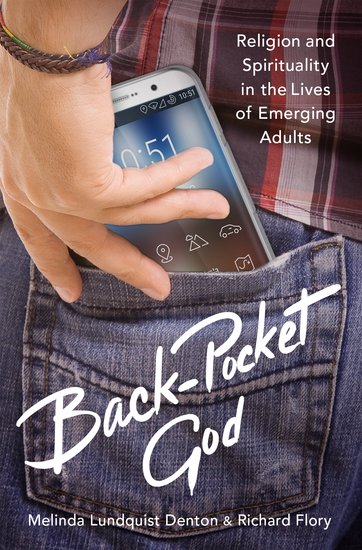
(Unsplash/Priscilla Du Preez)

You've probably heard the stories of how many industries today's young people have inadvertently killed, and I'm sad to say that we young adults also have borne the brunt of similar stories in religious circles as well. However, Back-Pocket God: Religion and Spirituality in the Lives of Emerging Adults, provides a more complex, honest and hopeful view that resists tired narratives of generational warfare. This study, the final wave of a nearly 20-year, four-part study called the National Study of Youth and Religion, surveys young people through their emerging adult years. The work of Melinda Lindquist Denton at University of Texas at San Antonio and Richard Flory at the University of Southern California, it offers a refreshing view of the so-called "millennial" spiritual mindset.
That's a term — millennial — that the authors reject. Citing the methodological difficulty of " 'generational' analysis," they instead focus their work on the influence of a "life stage" on a person's beliefs, practices and use of or need for religion. In this case, the study's subjects fall into a new sociological category of "emerging adult," an age group of young people between 18 and 29 years old whose lives are categorized by a phase of curiosity, uncertainty, increasing independence, a marginal sense of adulthood and possibility. People in this age range are "emerging" adults because traditional markers of adulthood like marriage, childbearing or career stability have seen longer delays due to market and sociological shifts in recent decades. Caught in between adolescence and traditional understandings of "adulthood," these individuals experience a unique sense of identity and meaning that affects their religious lives as well.
The authors summed up the "cultural spirituality" of today's emerging adults, across all identities, as one defined by individualism, a mostly-universal heaven, a moral sense that is found mostly through instinct and a "live and let live" mentality. Seventy-four percent of respondents (down from 78% in wave three and 84% in wave one) believe in God as a being that is personal but distant from the respondents' everyday lives.
Advertisement
The overall picture of religious involvement among emerging adults is one of decline, as the popular narrative goes. But within this general trend, many other details emerge. Even in the midst of overall religious decline, most respondents did not report antipathy toward organized religion; rather, they reported a lack of engagement or attention toward it. Few ideological concerns kept the respondents from practicing religion more fully, but rather a sense that religion held no use for their lives as they were currently living them. The respondents simply did not give religion much thought. Neither, however, did many respondents relate to the oft-used phrase, "spiritual but not religious," with only 17% of respondents finding the term to be a "very true" self-descriptor. It is as if, the authors muse, the respondents live with a "back-pocket God," one that is always there but never a main part of one's life.
I should tell you one important detail: by the definition of this book's study, I am an emerging adult myself. Normally, conversations of waning millennial religion grate on me, especially as a highly committed religious person by the outlines of this study, but this book felt refreshing. It tells not a story of hostility or inter-generational warfare — so frequently touted in cultural insults like "OK, Boomer" or "Tide pod generation" — but rather a story that seems more likely to me. It tells a story of western religion, and namely Christianity, no longer posing any real utility in young people's lives. The study suggests that young people have no ill feeling toward organized religion, but no need for it either. So where do they find meaning? Perhaps young adults have not left the church — the church has left them.
The questions I ask here fall well outside the bounds of the study, but the questions are live ones for people in religious communities who take research data like the results of the National Study of Youth and Religion seriously. As an educator, I took note of the many times the study's authors mentioned the significant lack of spiritual or religious literacy and articulateness of the study's participants. With the exception of some conservative Protestant respondents, the survey participants struggled to articulate a basic and coherent personal theology, expressing uncertainty and distractedness over a series of deep questions on the afterlife, God and other beliefs. Religious messaging has simply failed to meet them.
The study suggests that young people have no ill feeling toward organized religion, but no need for it either. So where do they find meaning?
So often, questions of reform and revival in the church start to feel like marketing meetings. But this study speaks beyond a need to market to unchurched "millennial" consumers whose values are at odds with other generations. Rather, the scope of the study — a study of people in a certain stage of life — speaks not to a marketing opportunity but to a pastoral void. What need of meaning do emerging adults have that is not met, perhaps not even voiced or expressed, in communities of faith? The future of communities of prayer and faith depends on answering this question without judgment and with patience and attention.
Then again, maybe this is less of a pastoral question and more of a question for the emerging adults who remain — emerging adults like myself and some of my peers. As I read Back-Pocket God, I wondered about just how committed people really were in the so-called glory days of church — in the 1950s or the 1350s, or whenever you might stick that pin in the timeline. Just how committed was the average church-goer, outside of a wish for conformity? How much of church history has always been a story of small groups of reform, vision and dedication? If the church is in search of that small but enthusiastic group of emerging adults, I know where to find them. We'd be happy to help.
[Rebecca Collins Jordan is an educator in New York City. Originally from Oregon, she is a graduate of Union Theological Seminary and the University of Montana.]






